We use cookies to improve your experience. By accepting you agree to our cookie policy

For some people, receiving a pain appointment can be a stressful and anxious moment. You may have waited a long while for this pain management appointment, and seeing your pain clinic appointment letter, whether it’s your first or not, can leave you several different emotions all at once.
These 18 top tips can help you to prepare for your pain appointment and as a result can help you to get the most out of it, sot hat you can leave the clinic knowing that you have dealt with everything that has been going on as best you can and you've got all the information you were hoping for.
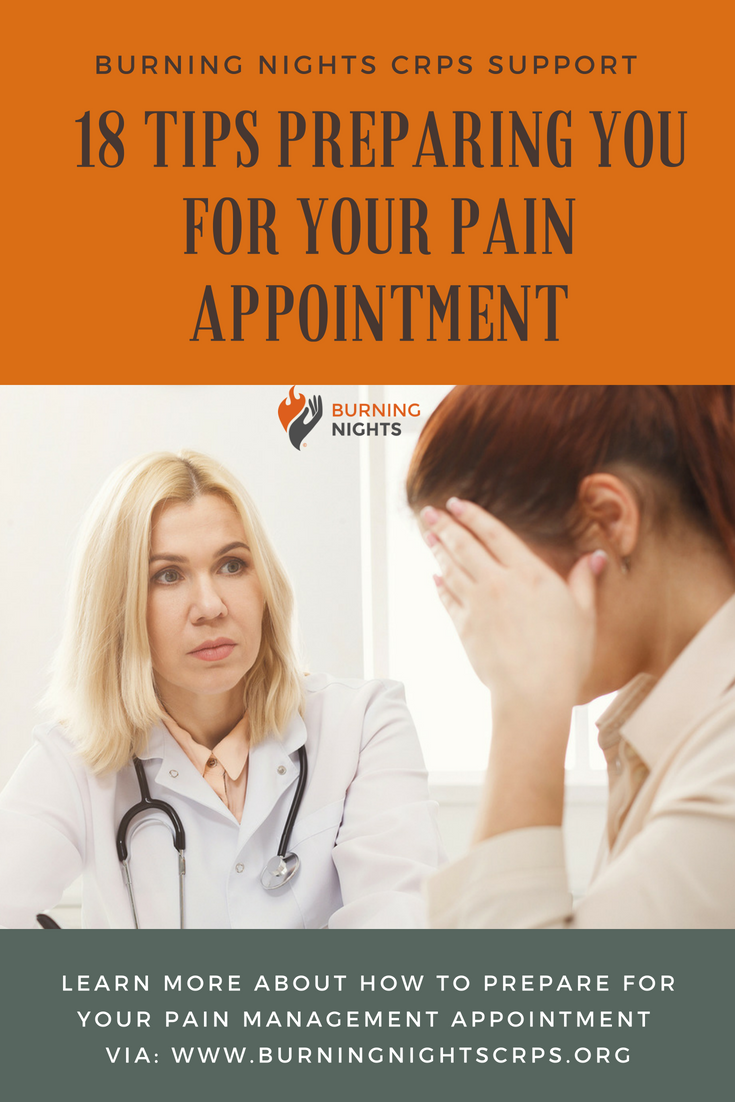
Often, just knowing that you’ve got to see the doctor can sometimes seem give you the stomach 'butterflies'. There will be a lot of information that you will need provide your Doctor with, as well as listen to and process the information that they give you. This might feel overwhelming and, especially where you are struggling or are in a flare up, this can mean that you are not always on top of your game. Many patients experience 'brain fog' as soon as they go into a pain management appointment, which can mean that you forget what you wanted to say to the Doctor.
This article with guidance and tips will hopefully help you to not only get the most out of your pain clinic appointment for your future care and treatment, but also provide you with some sense of comfort knowing that you’ve done everything that you possibly can to get across everything that you needed to.
Just like the majority of other medical appointments, you will have only a limited amount of time with your pain doctor, so making sure you know what you want to get through with them is crucial. If it is your first pain management appointment, this time will be approximately 30-40 minutes, but each pain clinic is different and so might be longer or shorter.
Your doctor will most likely want to discuss certain topics with you, but you should remember that your pain appointment is essentially about you. There might also be an examination, which could be very uncomfortable or even painful, but it will help the Doctor in their diagnosis, whether it is Complex Regional Pain Syndrome (CRPS) or another chronic pain condition.
To begin with, we will cover our top tips for the time before your pain appointment, from when you receive the pain clinic appointment letter.
If it is the first time you are going to see the pain specialist, then it’s important that you take with you a brief medical history of your problem, as well as a pain diary to show the various signs and symptoms you have been having. In the medical history of your current problem you should include:
It’s very easy to forget a sign or symptom that you’ve been having or a medication that you’ve tried when you’re actually face to face with your doctor, but it is important that you tell the pain specialist everything that’s been happening, to ensure you get an accurate diagnosis.
If you have been seeing your GP or other specialists for your condition or symptoms, then it is a good idea to bring along a summary of your medical information, which you can get from your GP. This summary should include the majority of test, scans, investigations and x-rays that you’ve had and will help the pain specialist to properly diagnose and assess what treatment you should try. If you have any scans, x-rays or other tests done previously, bring them or the results with you to the appointment.
Whether you are seeing the pain doctor for the first time or not, keeping a CRPS pain diary or symptom diary can be a useful tool. There are a number of apps that are available on the iPhone or Android phone and Burning Nights CRPS Support has a pain diary template that you can download for free. Then, all you will need to do is take the completed diary with you to your pain appointment and a copy for your doctor. The pain diary can show both yourself and your doctor any points where your pain spikes (symptom flare up) or reduces, what you were doing at the time, any new signs and symptoms and any side effects to any medication.
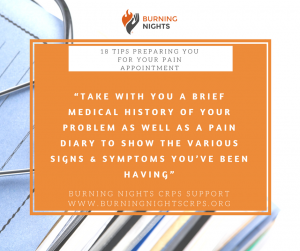
In the lead up to your pain appointment, keep a notepad and pen with, perhaps by the side of the bed, so you can note down any questions or concerns you have for your pain doctor as soon as they occur to you.
When you’re at your pain appointment you will no doubt forget things that you either wanted to discuss or wanted to ask, which is why noting down your questions beforehand and taking your list with you to your pain appointment can be useful. You could even take in a second copy of your questions and concerns to give to your pain doctor. Remember to leave yourself space after each question or point so you can note down the reply or answer from your pain doctor.
There’s no right or wrong set of questions that you should be asking your pain specialist, whether it’s your first pain appointment or not. By keeping your notepad and pen with you at all times before your appointment, you can jot down any questions you want to ask, no matter how 'silly' they might seem.
Why not get the Burning Nights CRPS Support Notepad & Pen Set and support CRPS awareness!
If you’re visiting your pain specialist for the first time, your questions might include:
These questions are not set down nor are they the ones that you definitely should use. These are just for guidance to help you prepare for your pain appointment.
Take a look at About My Pain and their list of Questions To Ask Your Doctor.
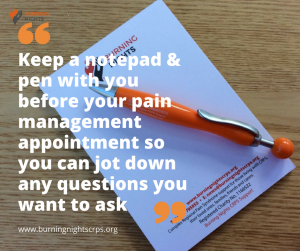
If it is your first pain management appointment, then you may wish to take some pictures of the various signs and symptoms you may have had since your problems started. There’s no need to take an album with you, just a few pictures that perhaps show any colour changes, mottling of your skin, nail or hair issues, etc. This can the pain doctor to properly diagnose your condition, especially Complex Regional Pain Syndrome (CRPS), because one element of the Budapest Criteria for Diagnosing CRPS is your patient history.
If you are going through a CRPS or chronic pain condition journey on your own, it is a good idea to ask a friend, relative, carer or family member to come along with you to your pain appointment. If you want someone to come with you, make sure to as them in advance, once you have received the date of your pain appointment. Don't leave it until the last moment and be aware that some people might not be comfortable with going to medical appointments.
Having someone with you at the pain appointment can be a comfort to you and give you some confidence. It also means that they can be there to listen to what your pain specialist says and recommends. Your pain specialist will probably go through a lot of medical information, perhaps including giving you a CRPS or other chronic pain diagnosis, and it is important that you can trust the person you take with you.
Your friend, relative or carer can also note down the answers to any questions that you take in with your to your pain appointment. You may feel frightened, anxious or flustered when you visit your pain specialist, so having a second pair of eyes and ears can be very helpful. The person with you can offer you both support and comfort, especially if it’s your first pain appointment.
Even though you may take along a friend, relative, carer or partner, do not let them speak over you or talk for you. The condition is affecting you and even though they may have witnessed a symptom you mention, they are not you, and it is important that it is you that tells the pain specialist what’s been happening.
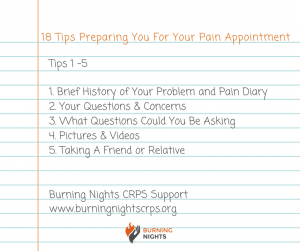
If you need an interpreter, you will need to contact the hospital where you are going to request an interpreter. You will need to give at least 2 weeks notice to request an interpreter.
Your worry and stress will undoubtedly have increased by the day before your pain management appointment. If this is your first pain management appointment, it is best if you pack up everything that you will need in advance. Don’t leave things until just before you are due to leave for your pain appointment, as you could forget to take something that you need. Remember to check the time of the appointment because it is very easy to misread times and dates, especially if you have brain fog or simply because of living with CRPS or chronic pain.
Some things you need to take with you:
We will now look at some top tips for during your pain appointment, including for the the day of your pain appointment.
The pain specialist will have a certain list of things they will want to get through and ask. However, it is very important to remember that it is your appointment and you may not have understood everything that has been said. Taking on board the tips listed here is ideal to help focus your mind on what you need to remember to get through in the appointment. If you have brought a friend with you, they will also help you remember what you need to at the appointment.
The day of your pain appointment has now finally arrived! Your body will probably be reacting to the stress of the appointment, so try some deep breathing exercises or a 5 minute mindfulness exercise to try and calm yourself down to reduce the chances of the symptoms of your pain condition worsening. You want to make sure you communicate everything you want to with the pain specialist and get the answers you are looking for.
If you have someone with you at the appointment, they should give some comfort knowing they are there with you, to help you understand what the pain consultant is saying.
Try and arrive at least 15-30 minutes early so you can calmly check-in instead of being rushed and flustered on the last minute. Hand in any completed paperwork and complete any documents that the nurses or receptionist give you, such as pain questionnaires, quality of life questionnaires, etc.
It’s important to remember that the appointments don’t always run on time and you may have to wait. If you think you’ve been waiting for longer than the advised time, go and ask at reception or speak to a nurse and mention that you’ve been waiting for longer than the waiting time, just in case you have been missed.
If this is your first pain management appointment, you will probably be seen by a Doctor who will fully assess you and your pain. Not only will they listen to what’s been going on, injuries, pain, signs and symptoms but they will also assess your mood, sleep, emotional well-being as well as how your pain affects your daily life.
Tell the Doctor all that has gone on regarding your pain and/or symptoms. Tell them about all the pains, signs, symptoms - even if you’re uncertain whether to mention something or not, tell the Doctor because it may be of help. Show them the photos of different signs and symptoms and give them a copy of your pain diary, if you’ve got one.
Give the pain doctor either a list of your current medication or a copy of your current prescription, along with any x-rays, scans or results of tests you’ve had done previously in regard to your current pain problem. Don’t forget to tell the Doctor or give the Doctor your list of over the counter, homeopathic, Chinese Medicine, vitamins, supplements, ointments, creams, etc.
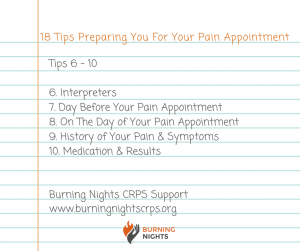
During your first pain management appointment, Doctor will be going through a lot of information and will be asking for a lot of answers to try and fully assess and diagnose you properly. You will be asked numerous questions about your pain, your life, signs and symptoms, sleep, daily activities and how would you rate your pain levels. You may get asked questions such as:
Pain appointments, especially the first, might include a physical examination to allow the Doctor to assess your signs and symptoms whilst you are in the appointment. Diagnosing Complex Regional Pain Syndrome (CRPS) will require a doctor to look for various signs and symptoms according to the Budapest Criteria.
After the pain Doctor has gone through everything with you (i.e. your medical history, history of the problem, signs, symptoms, concerns, medications, previous treatments, etc.) they will be in a position to hopefully go through a probable diagnosis and subsequent treatment options with you. If you are diagnosed with Complex Regional Pain Syndrome (CRPS), the Doctor will use the country’s current guidelines for treatment options.
After you’ve had your physical examination and gone through all of the doctors questions, you can ask the doctor what you can do whilst you’re waiting for your next pain appointment or the appointment for your treatment to start - i.e. what self-management options are there.
You could ask if there is anything that you should be doing in terms of keeping your limbs moving. For example, desensitisation or other alternative therapies, such as deep breathing, mindfulness meditation, mirror therapy. You can also also ask to find out more about psychological therapies to help you with any mental health issues you may be having, such as depression or PTSD.
It is likely that you will receive a lot of information, much of which can be confusing, especially if it is your first pain appointment. If you don’t understand something or you miss what the doctor has said, don’t be afraid or embarrassed to ask the doctor to repeat it or ask them to explain something - they are there to help you. It might seem easier to just note it down and 'Google' it later or feel it doesn’t matter that you’ve missed what the doctor said, but remember that it is your pain appointment and it is important that you understand what the specialist is saying and what the plan is for your treatment.
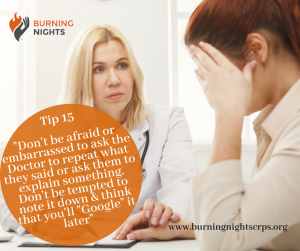
Hopefully you will have brought your questions or concerns with you and even a copy for your pain specialist. In addition to the information that the Doctor will give you, they can also answer your questions, so it is important to take note of their answers. If you aren't able to do that, you could ask your friend, relative or carer to note down the replies. It is much better to raise any queries or concerns that you might have, rather than not because you feel that the question is 'silly'.
If it’s the first time at a pain appointment, make that sure you fully understand what the treatment plan is for you. It is very easy to let all the other questions and points of concern run away with the conversation and either not hear or not receive a plan of how the pain specialist plans to treat you. As discussed in Tip 15, if you don’t understand something that the doctor has mentioned, stop them and ask them to repeat what they’ve said or ask them to explain it to you. You need to be happy when you leave the pain appointment that you understand what has been said.
You can ask to be CC'd or copied into the correspondence from the pain specialist to your GP or your referring physician. If the pain management appointment was your first, then the letter should tell you your diagnosis and possible treatment options. If this wasn’t your first appointment, the letter to your GP will explain what was said in the appointment and what the next step is. If you forget to ask to be copied into the correspondence, take a look at the Burning Nights CRPS Support article How To Access Your Medical Records.
The pain specialist should have explained how they plan to go forward with your care. If in doubt, ask the Doctor when you will receive future appointments and ask how long will you be waiting on the list for either the treatments that you've discussed or the waiting time for your next appointment.
Being prepared for your pain appointment, whether it is your first or not, can help you to have some control over the situation and ensure that you don't forget anything. If it's your first appointment and you're searching for answers or if it's your 50th pain management appointment and you're looking for new treatments or research - preparation can help you to get the most out of the time.
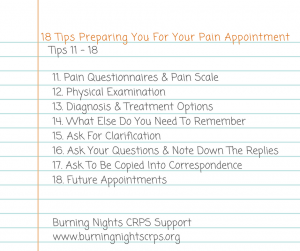
Burning Nights CRPS Support has written a number of articles on living with Complex Regional Pain Syndrome and chronic illness. Here are some you may be interested in:

We use cookies to improve your experience. By accepting you agree to our cookie policy
 £
£